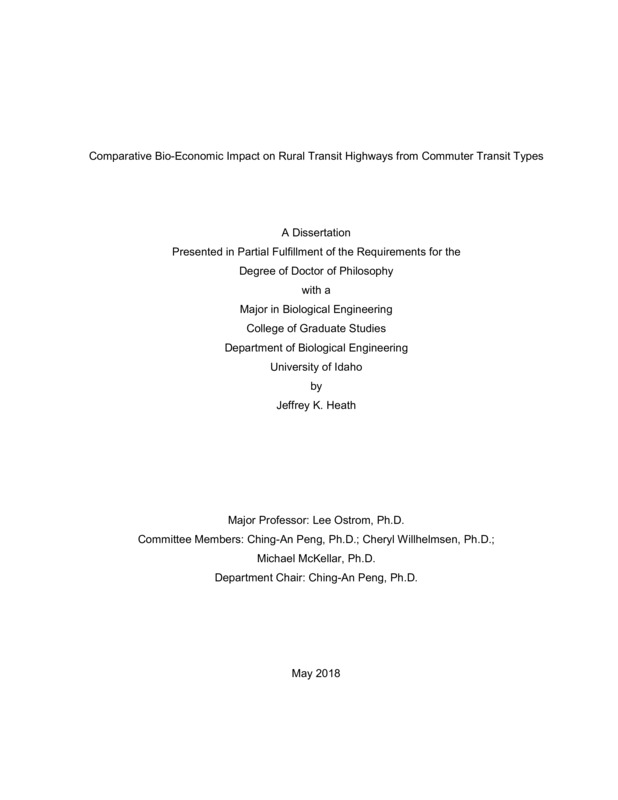Comparative Bio-Economic Impact on Rural Transit Highways from Commuter Transit Types
Heath, Jeffrey Kevin. (2018-05). Comparative Bio-Economic Impact on Rural Transit Highways from Commuter Transit Types. Theses and Dissertations Collection, University of Idaho Library Digital Collections. https://www.lib.uidaho.edu/digital/etd/items/heath_idaho_0089e_11357.html
- Title:
- Comparative Bio-Economic Impact on Rural Transit Highways from Commuter Transit Types
- Author:
- Heath, Jeffrey Kevin
- Date:
- 2018-05
- Keywords:
- Bus Economics Engineering Environment Safety Transportation
- Program:
- Biological & Agricultural Engineering
- Subject Category:
- Transportation; Industrial engineering; Environmental engineering
- Abstract:
-
The purpose of this study is to examine the bio-economic components affecting the several transit systems sponsored by the Department of Energy at their three remote sites in Idaho, Nevada, and New Mexico. Significant economic data was developed prior to and in conjunction with this research. Therefore, the primary focus if this research is on the non-economic factors and their effect on the overall bio-economic view of the transit system identified. Due to a prevailing assumption that one transit type was superior to others, the resultant Null Hypothesis was created to test the validity of this claim and to function as the framework for this research; as stated herein: there is not a quantifiable difference in bio-economic impact between busing versus carpooling with regard to enhanced safety, reduced environmental impact, or positive economics per user unit. As summarized in a final ranking of transportation types and ranked within the several key hypothesis effecting factors, this research overwhelmingly proved the Null Hypothesis false. The mass transit systems (buses) in place at the Idaho and Nevada sites remain superior to other transit forms in common use by commuters within the rural transit highway system studied. Limited but representative busing capability at the New Mexico site, ranks second overall in transit superiority. This research did not note any difference between the Government-provided service, like that found in Idaho and New Mexico, versus a commercially-provided service, like that found in Nevada. This research compiles the body of knowledge and demonstrated rigor needed to developed a framework to support further transit research to test if there is another more superior system to be used, perhaps rail.
- Description:
- doctoral, Ph.D., Biological & Agricultural Engineering -- University of Idaho - College of Graduate Studies, 2018-05
- Major Professor:
- Ostrom, Lee
- Committee:
- Peng, Ching-An; Wilhelmsen, Cheryl; McKellar, Michael
- Defense Date:
- 2018-05
- Identifier:
- Heath_idaho_0089E_11357
- Type:
- Text
- Format Original:
- Format:
- application/pdf
- Rights:
- In Copyright - Educational Use Permitted. For more information, please contact University of Idaho Library Special Collections and Archives Department at libspec@uidaho.edu.
- Standardized Rights:
- http://rightsstatements.org/vocab/InC-EDU/1.0/

